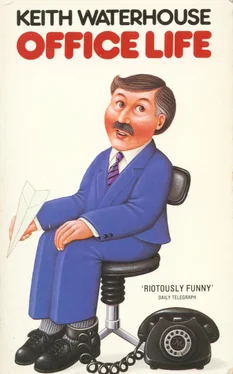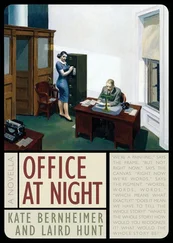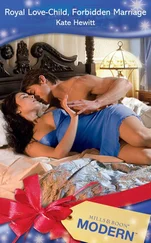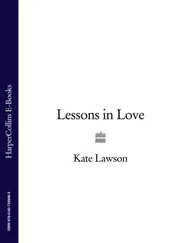It was all too absurd. Mrs Rashman would be setting off on honeymoon within a day or two, she had more to do with her time than stroll across bridges with Mr Hakim, who in any case was at this moment sunning himself on the Algarve. Not that he had the simple courtesy to send his colleagues a postcard, perhaps it was not the done thing at British Albion. (Gryce would rather regret it if this were so. In previous billets, postcards from those on holiday had made a colourful display when Sellotaped to windows or the sides of filing cabinets. They had been quite a feature.)
But as the bus turned into the station forecourt after being held up considerably on London Bridge by a brewer's dray, Gryce, clinging to the platform rail, saw them again, just crossing the road. Well, if it was not Mrs Rashman and Mr Hakim, it was their exact doubles. Such things, he well knew, did happen in life.
In the station, where the President of one of the African republics was waiting to inspect his season ticket, Gryce learned from a chalked notice on a blackboard that trains were subject to delay due to a signal failure at New Cross. He suddenly felt that he could do with a drink. He was not a drinking man by any manner of means, especially not at this hour of the day, but he had to admit that he had been getting a taste for the old vino lately. A glass of cold white wine, if pubs sold wine by the glass as he believed they did in this enlightened day and age, would steady his nerves. There was also a case to be made out for having a sausage or shepherd's pie style of thing, he had left most of his lunch untouched thanks to Thelma.
He found a Victorian-looking pub not a hundred yards from the station, quite pleasant really and they served a Scotch egg superior in every way to some of the mildewed golfballs encountered by Gryce during his lifetime. The wine was well chilled and the measure generous, by pub standards. Gryce was beginning to feel better. The fellow standing at the other side of the circular bar reminded him of someone or other, but he wasn't going to put himself to the trouble of trying to put a name to the face.
A television actor, would it be? Jephson, Jepson, some name like that? Had appeared years ago in, oh, what was it now, Z Cars, but was little seen these days, probably the victim of typecasting. Jefferson. No, that wasn't it either.
As Gryce tried to put the conundrum firmly out of his head he saw that the familiar-looking stranger was staring across the bar at him with the same kind of puzzled, in fact pained, expression as must have been evident on Gryce's own face. After a moment the expression turned to the relief of recognition. Picking up his half pint of lager, this Jephson or Jepson or Jefferson did a loping circuit around the bar and greeted Gryce warmly.
'Long time no see!'
'Long time no see!' echoed Gryce. In fact — it took him only a second, he never forgot a face — it had been barely a month. Of course! Parsloe, one of his partners in crime at his old billet, Comform! One of the famous Four Musketeers who had all got their redundancy notices on the same day!
There certainly was a resemblance to that Z Cars chap. Curious that Gryce had never noticed it in all the time he had known Parsloe.
'Funny,' said Parsloe, 'how you can see somebody you've known for I don't know how long, and your mind goes blank.'
'It's seeing them out of context,' said Gryce.
Parsloe agreed that this was so, backing up the theory with a story about giving a light to a man at a bus-stop and not realizing until later that it was his milkman. 'And I wouldn't mind betting,' said Gryce at the conclusion of this anecdote, 'that he didn't recognize you either!'
They began to gossip warmly, each one asking the other what brought him to this neck of the woods. It appeared that Parsloe, for his sins, was polishing his trouser seat at a billet known as United Products, one of those glass shoe-boxes somewhere off Borough High Street; the pub was one of his ports of call when the delights of the staff canteen palled. Parsloe had always had something of a reputation for elbow-lifting, it was what was supposed to have tipped the scales against him when the redundancies were being considered.
The news of their two other fellow-reprobates was good: one had wangled his way into local government complete with bullet-proof pension, apparently his father-in-law had been able to pull strings, and the other had taken the plunge and had emigrated, or anyway was about to emigrate when last heard of by Parsloe, to New Zealand.
Gryce did not particularly want a second glass of wine and positively not a third, but Parsloe had drained his half pint and whether Gryce bought him a drink or he bought one himself, a further round would then have to be got in by one or other of them to complete the sequence. It looked as if Gryce had let himself in for a lunch-time drinking session. He might as well relax and enjoy himself for a change.
'What happened,' he asked after he had ordered the drinks and Parsloe had thanked him and said that it was his first today, 'to that plan you had for starting up a what was it now, a do-it-yourself shop, was it?' Gryce in fact remembered very well what it was: Parsloe had talked of nothing else during their last days at Comform, he had become a bore on the subject. Goodness knew how much he had added to the company's telephone bill with his interminable calls to timber merchants and the like, as if they had nothing to do all day except discuss the price of materials with total strangers.
'Couldn't get the wood,' jested Parsloe. 'No, seriously, it was no joke. Whenever I found suitable premises it was a case of, oh, you'll need planning permission for change of use, and that's going to take six months at least; or the local authority hasn't yet decided whether to designate the area for future development, so come back in another ten years' time and we'll let you know. And to cap it all, the bank gave me back-word on the loan they'd promised, half-promised anyway, they don't want to know about the small businessman these days, simply do not want to know. In the end I gave up. I thought sod it.'
A likely story, was what Gryce thought. If you asked him, it was more a question of coming down to earth with a bang after discovering that one cannot live on pipedreams.
'So now you're with who is it again, United who?'
'Products. I was so cheesed off I just marched into the Job Centre and picked the first clerical post going. Pays the rent.'
Gryce decided against mentioning that he had done the self-same thing, Parsloe made it sound as if the Job Centre was the last resort of the damned. 'United Products, I don't think that rings any bells. What do you do, in a word?'
'As little as possible. No, seriously. If I told you I was in a department called Traffic Control, you'd get the wrong idea. Nothing to do with transport in any shape or form, it's supposed to be the nerve-centre of the office, keep it ticking over smoothly. Or so I'm reliably informed.'
'What I meant was,' pursued Gryce with a distinct feeling of déjà vu, 'was what does United Products do?'
'That's a very good question,' said Parsloe, setting down his glass. 'A very good question indeed.'
Gryce felt a need to breathe in deeply. He was conscious of an internal trembling which, he knew from past experience, would have an unfortunate vibrating effect on his voice. So his question, 'You mean you don't know?' did not get asked. Parsloe answered it, nonetheless.
'I can tell you what they used to do, if that's any help. Exports — packing, shipping, they had their own fleet, so I'm told. Then when the export market slackened off, they started to diversify. What into, I couldn't tell you. High finance, who knows? I don't think any of us know. I very much doubt if they know themselves.'
Читать дальше












